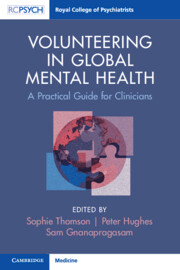Book contents
- Volunteering in Global Mental Health
- Reviews
- Volunteering in Global Mental Health
- Copyright page
- Contents
- Foreword
- Contributors
- Introduction
- Section 1 Key Principles, Theory and Concepts
- Section 2 Practical Guide and Toolkit
- Chapter 6 Preparation for Global Volunteering: Professional, Personal, Psychological and Practical
- Chapter 7 Onsite: Working in Another Country
- Chapter 8 Implementing and Delivering Training as a Global Volunteer
- Chapter 9 Psychological Techniques Toolkit
- Chapter 10 After the Trip: Coming Home and Sustainability
- Chapter 11 Monitoring, Evaluation and Research
- Section 3 Reflective Accounts and Perspectives of Global Mental Health Volunteering
- Section 4 Future of Global Volunteering
- Book part
- Glossary
- Index
- References
Chapter 8 - Implementing and Delivering Training as a Global Volunteer
from Section 2 - Practical Guide and Toolkit
Published online by Cambridge University Press: 08 November 2023
- Volunteering in Global Mental Health
- Reviews
- Volunteering in Global Mental Health
- Copyright page
- Contents
- Foreword
- Contributors
- Introduction
- Section 1 Key Principles, Theory and Concepts
- Section 2 Practical Guide and Toolkit
- Chapter 6 Preparation for Global Volunteering: Professional, Personal, Psychological and Practical
- Chapter 7 Onsite: Working in Another Country
- Chapter 8 Implementing and Delivering Training as a Global Volunteer
- Chapter 9 Psychological Techniques Toolkit
- Chapter 10 After the Trip: Coming Home and Sustainability
- Chapter 11 Monitoring, Evaluation and Research
- Section 3 Reflective Accounts and Perspectives of Global Mental Health Volunteering
- Section 4 Future of Global Volunteering
- Book part
- Glossary
- Index
- References
Summary
Training is the most common and perhaps the most useful role for a global volunteer at this stage in the development of global mental health. Once initial agreements with hosts have been confirmed, it will be time to firm up details of agreed objectives, what training package or materials would be helpful, who will be involved, details of timetabling, as well as how best to deliver the training requested by the host. Special consideration of psychosocial interventions needs to be given to any training in mental health, as these therapeutic interventions are an integral part of the management of all people with mental health conditions.
- Type
- Chapter
- Information
- Volunteering in Global Mental HealthA Practical Guide for Clinicians, pp. 68 - 84Publisher: Cambridge University PressPrint publication year: 2023



